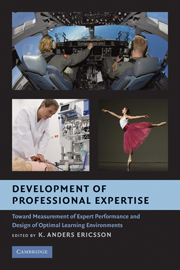 Development of Professional Expertise
Development of Professional Expertise Book contents
- Frontmatter
- Contents
- List of Figures
- List of Tables
- List of Contributors
- 1 The Measurement and Development of Professional Performance: An Introduction to the Topic and a Background to the Design and Origin of This Book
- SECTION 1 CHALLENGES IN PAST AND CONTEMPORARY EFFORTS TO MEASURE AND TRAIN THE OBJECTIVE PERFORMANCE OF PROFESSIONALS
- SECTION 2 PAST AND CONTEMPORARY EFFORTS TO DESIGN INSTRUCTION, TRAIN, AND MAINTAIN PROFESSIONAL PERFORMANCE
- SECTION 3 THE ASSESSMENT AND TRAINING OF SKILLED AND EXPERT PERFORMERS IN THE MILITARY
- SECTION 4 THE DEVELOPMENT OF EXPERTISE AND EXPERT PERFORMANCE
- 15 The Influence of Learning Research on the Design and Use of Assessment
- 16 Acquiring Conceptual Expertise from Modeling: The Case of Elementary Physics
- 17 Teaching for Expertise: Problem-Based Methods in Medicine and Other Professional Domains
- 18 Enhancing the Development of Professional Performance: Implications from the Study of Deliberate Practice
- 19 It Takes Expertise to Make Expertise: Some Thoughts About Why and How and Reflections on the Themes in Chapters 15–18
- 20 The Value of Expertise and Expert Performance: A Review of Evidence from the Military
- 21 Expertise in the Management of People: A New Frontier for Research on Expert Performance
- Name Index
- Subject Index
- References
20 - The Value of Expertise and Expert Performance: A Review of Evidence from the Military
Published online by Cambridge University Press: 04 August 2010
- Frontmatter
- Contents
- List of Figures
- List of Tables
- List of Contributors
- 1 The Measurement and Development of Professional Performance: An Introduction to the Topic and a Background to the Design and Origin of This Book
- SECTION 1 CHALLENGES IN PAST AND CONTEMPORARY EFFORTS TO MEASURE AND TRAIN THE OBJECTIVE PERFORMANCE OF PROFESSIONALS
- SECTION 2 PAST AND CONTEMPORARY EFFORTS TO DESIGN INSTRUCTION, TRAIN, AND MAINTAIN PROFESSIONAL PERFORMANCE
- SECTION 3 THE ASSESSMENT AND TRAINING OF SKILLED AND EXPERT PERFORMERS IN THE MILITARY
- SECTION 4 THE DEVELOPMENT OF EXPERTISE AND EXPERT PERFORMANCE
- 15 The Influence of Learning Research on the Design and Use of Assessment
- 16 Acquiring Conceptual Expertise from Modeling: The Case of Elementary Physics
- 17 Teaching for Expertise: Problem-Based Methods in Medicine and Other Professional Domains
- 18 Enhancing the Development of Professional Performance: Implications from the Study of Deliberate Practice
- 19 It Takes Expertise to Make Expertise: Some Thoughts About Why and How and Reflections on the Themes in Chapters 15–18
- 20 The Value of Expertise and Expert Performance: A Review of Evidence from the Military
- 21 Expertise in the Management of People: A New Frontier for Research on Expert Performance
- Name Index
- Subject Index
- References
Summary
Intuitively we seek expertise in all areas of human activity as observers, beneficiaries, and performers. Beyond intuition, however, can we justify the resources we expend in developing expertise and expert performance? This chapter concerns the value of expertise and expert performance in a high stakes area: military operations. It provides some quantitative evidence of this value and its relation to themes that appear to be common to the development of expertise across many areas and are raised in the chapters of this book.
THEMES
This book addresses the development, measurement, and assessment of expertise from many directions and in many contexts. Findings and conclusions from its chapters may be summarized and organized around a number of “themes.” These themes apply to the development, measurement, and assessment of expertise in the military. They help crystallize and focus the ways individuals and groups prepare for the exigencies that inevitably arise in the performance of many activities, including military operations. These themes may be summarized and described, in no particular order, as the following.
Self-Assessment and Self-Directed Learning
Learners at all levels of development are increasingly expected to take responsibility for their professional growth. This trend has been accompanied by an increasing emphasis on techniques, capabilities, and tools that help them become more self-directed and self-assessing.
- Type
- Chapter
- Information
- Development of Professional ExpertiseToward Measurement of Expert Performance and Design of Optimal Learning Environments, pp. 449 - 469Publisher: Cambridge University PressPrint publication year: 2009
References
- 9
- Cited by
